Parakeets are popular pets because of their colorful feathers, lively personalities, and ability to mimic human speech.
However, they can also be boisterous birds that produce various sounds, including squawking. Squawking is a loud, harsh, and unpleasant sound that can annoy the owner and the bird. But why do parakeets crow, and what does it mean?
This article will explore the reasons behind parakeet squawking and how to deal with it.
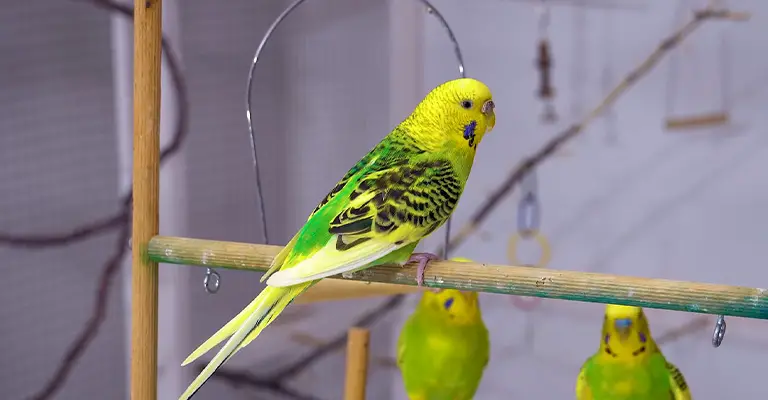
What Is Squawking In A Parakeet?
Squawking is one of the many vocalizations that parakeets can make. It differs from chirping, a softer, more pleasant, and musical sound that indicates happiness, contentment, and social interaction.
Squawking is usually a sign of distress, discomfort, or dissatisfaction in parakeets. It can mean stress, fear, anger, frustration, or pain. It can also be a way of seeking attention or warning others of potential danger.
Reasons For Squawking In A Parakeet
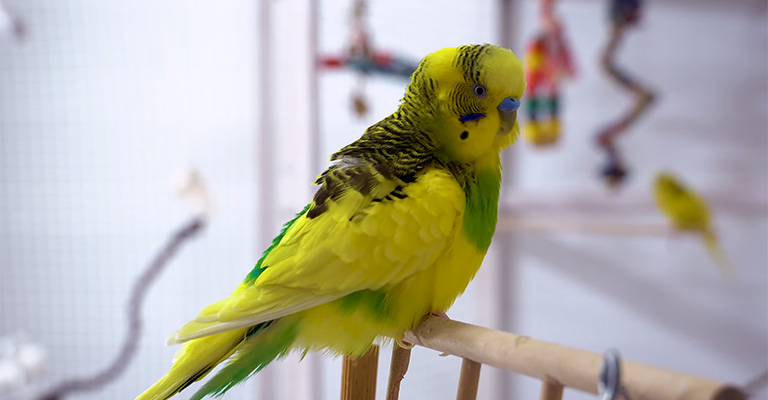
There are many possible reasons why your parakeet may squawk. Some of them are:
Stress
Parakeets are sensitive animals that can get stressed by various factors, such as changes in their environment, routine, diet, or social group; loud noises; lack of attention; boredom; hunger; or illness. Stress can cause your parakeet to screech to express discomfort or anxiety.
To reduce stress in your parakeet, you should provide it with a comfortable cage that has enough space, toys, perches, and food; keep it in a quiet and safe place away from direct sunlight and drafts; maintain a consistent daily schedule; give it enough attention and interaction; and monitor its health regularly.
Fear
Parakeets are prey animals with an instinct to alert their flock members of any potential threat. Suppose your parakeet sees something that scares it, such as a predator, a stranger, a new object, or a sudden movement. In that case, it may squawk loudly as an alarm call to warn you or other birds.
To reduce fear in your parakeet, you should avoid exposing it to things that trigger its fear response, introduce new things gradually and with positive reinforcement, and provide it with hiding places and coverings in its cage where it can feel safe.
Anger
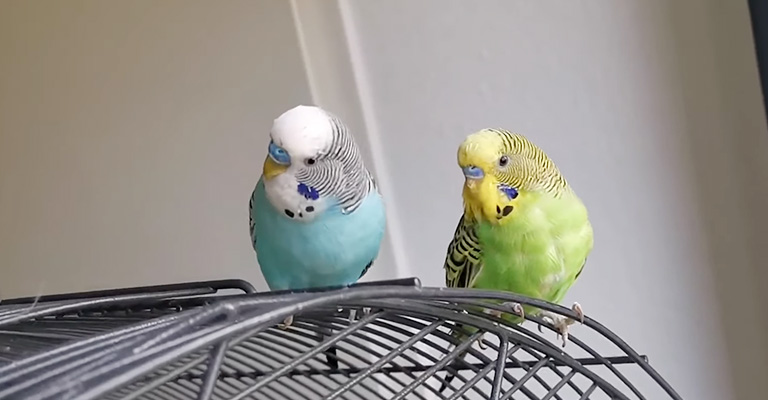
Parakeets are social animals with personalities and preferences. Sometimes they may get angry or annoyed by something or someone that bothers them, such as another bird that invades their space or takes their food.
A human that tries to touch them or take them out of their cage when they don’t want to; or a toy that frustrates them. Anger can cause your parakeet to squeal to show its displeasure or aggression.
To reduce irritation in your parakeet, you should respect its boundaries and signals; avoid forcing it to do something it doesn’t like; provide it with enough resources and space; and separate it from other birds if they don’t get along well.
Frustration
Parakeets are intelligent animals that need mental stimulation and challenges. Sometimes they may get frustrated by something they can’t figure out or achieve, such as a puzzle toy that is too hard for them, a trick they can’t learn, or a goal they can’t reach. Frustration can cause your parakeet to squeal to vent its emotion or ask for help.
To reduce frustration in your parakeet, you should provide it with suitable toys and activities that match its skill level and interest, teach it new tricks and behaviors gradually and with rewards, and help it overcome obstacles if needed.
Attention
Parakeets are social animals that crave attention and interaction from their owners and other birds. Sometimes they may squawk to seek attention or communication from you or other birds.
They may want you to talk to them, play with them, pet them, or give them treats. They may also want to join you in whatever you do or see what you do.
Reducing Parakeet Squawking: Practical Tips
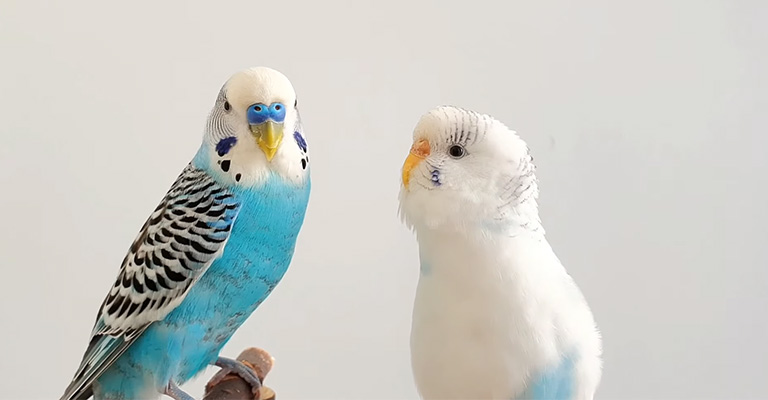
Reducing your parakeet’s squawking requires a comprehensive approach that addresses its needs and provides a comfortable and stimulating environment. Here are some practical tips to help minimize excessive squawking:
Cage Setup and Environment
Ensure your parakeet’s cage is spacious, well-equipped with toys and perches, and in a quiet and safe area. Avoid placing it in direct sunlight or drafts, as these can cause stress. A comfortable and secure environment can help reduce anxiety and excessive vocalizations.
Establish a Routine
Parakeets thrive on routine. Establish a consistent daily schedule for feeding, social interaction, and playtime. Maintaining a structured performance provides a sense of security and predictability for your parakeet.
Social Interaction and Attention
Parakeets are social birds and require regular interaction. Spend quality time with your parakeet, engaging in gentle play, training sessions, or simply talking to it. Ensure it receives sufficient mental and physical stimulation to help alleviate boredom or loneliness.
Monitor and Address Health Concerns
Regularly monitor your parakeet’s health. Unresolved health issues can cause discomfort and contribute to excessive squawking. Schedule routine check-ups with an avian veterinarian and provide a balanced diet to support your parakeet’s overall well-being.
Respect Boundaries and Avoid Forcing
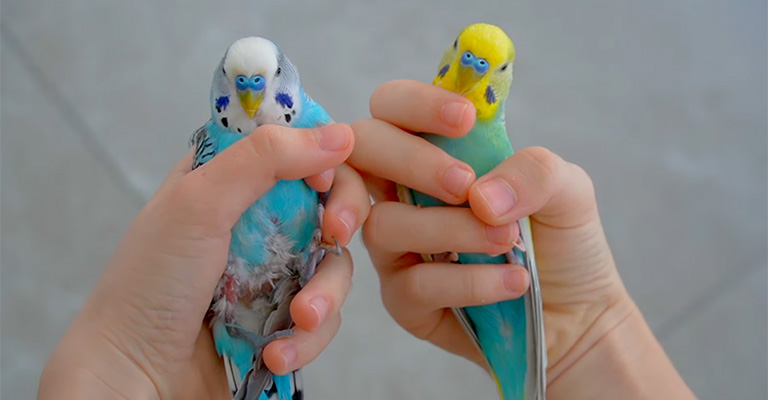
Respect your parakeet’s boundaries and signals. Avoid forcing it to do something it dislikes, which can increase stress and vocalizations. Instead, build trust and positive associations through patient and gradual training.
Provide Suitable Toys and Activities
Offer a variety of toys and activities that match your parakeet’s skill level and interests. Rotate the toys regularly to keep them engaging and stimulating. Puzzle toys, foraging opportunities, and interactive toys can help redirect your parakeet’s focus and reduce excessive squawking.
Positive Reinforcement Training
Utilize positive reinforcement techniques when training your parakeet. Reward desired behaviors with treats or praise, and ignore or redirect unwanted squawking. Gradually teach it new tricks and behaviors, ensuring a positive and rewarding experience.
Ignore Excessive Squawking
When your parakeet engages in excessive squawking for attention, it’s important not to reinforce the behavior by responding. Instead, ignore the noise and provide engagement and interaction only when calm and quiet. This helps discourage attention-seeking squawking.
FAQ
Squawking and chirping are two different types of sounds that parakeets make. Squawking is a loud, harsh, unpleasant sound indicating distress, discomfort, or dissatisfaction. Chirping is a softer, more pleasant, and musical sound that indicates happiness, contentment, and social interaction.
Parakeet squawking can be very loud, depending on the individual bird and the situation. Some parakeets may squawk louder than others when they are more stressed, scared, angry, or frustrated. Parakeet squawking can reach up to 70 decibels, comparable to the sound of a vacuum cleaner or a busy street.
Parakeets may squawk occasionally or frequently, depending on the individual bird and the situation. Some parakeets may squawk more than others or squawk more when stressed, scared, angry, or frustrated. Parakeets may also squeal more at certain times, such as in the morning or evening, when they are more active or vocal.
Parakeets may squeal for a few seconds or minutes, depending on the individual bird and the situation. Some parakeets may squawk longer than others or squawk longer when they are more stressed, scared, angry, or frustrated. Parakeets may also squeal longer if they don’t get a response from you or other birds or if they get an answer that reinforces their squawking.
You can’t completely stop your parakeet from squawking, as it is a natural and normal behavior that serves a purpose for your bird. However, you can reduce the amount and intensity of your parakeet’s squawking by addressing the underlying cause of it and providing your bird with a healthy and happy environment.
Conclusion
Parakeet squawking is a typical and natural behavior with various meanings and causes. It can indicate stress, fear, anger, frustration, or attention-seeking in your bird.
It can also be a way of communicating with you or other birds. To reduce your parakeet’s squawking, you should provide a comfortable cage with enough space, toys, perches, and food.
By understanding the potential causes and implementing practical solutions such as providing a comfortable environment, regular social interaction, monitoring their health, and using positive reinforcement training.
You can help reduce excessive squawking and create a harmonious relationship with your parakeet. Remember to be patient, respectful of their boundaries, and attentive to their needs.